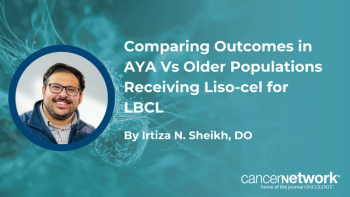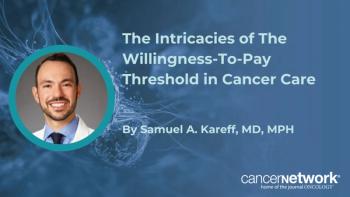
Geriatric Assessment-Driven Intervention Reduces Chemotherapy-Related Toxic Effects in Older Individuals With Cancer
Use of a multidisciplinary geriatric assessment-driven intervention resulted in a reduction in grade 3 or higher chemotherapy-related toxic events.
By utilizing a geriatric assessment-driven intervention (GAIN), investigators were able to reduce grade 3 or higher chemotherapy-related toxic effects in older adults with cancer, according to results from a trial (NCT02517034) that were published in JAMA Oncology.
In total, 50.5% (95% CI, 45.6%-55.4%) of patients in the GAIN arm experienced grade 3 or higher adverse effects (AEs) compared with 60.6% (95% CI, 53.9%-67.3%) in the standard of care (SOC) arm. Investigators also observed an absolute increase in advance directive completion of 28.4% in the GAIN arm that was significant vs 13.3% in the SOC arm (P<.001).
“Reducing chemotherapy-related toxic effects among vulnerable older adults with cancer without compromising treatment efficacy has been challenging for oncologists. Prior smaller studies of older adults have demonstrated mixed results regarding the influence of [geriatric assessment]–driven interventions on chemotherapy-related toxic effects,” the study’s investigators wrote.
Investigators enrolled 613 patients from August 2015 to February 2019. Patients in the study had a median age of 71 years, and over half of all patients (59.0%) were women. Additionally, 78.7% of patients were White, and 80.7% were non-Hispanic. Additionally, the most common cancer types were gastrointestinal (33.4%), breast (22.5%), lung (16.0%), genitourinary (15.0%), and gynecologic (8.9%). A total of 71.4% (of patients had stage IV disease.
The median follow-up in the GAIN arm was 85 days, and 80 in the SOC arm (P = .48). Investigators identified and recommended 3971 potential interventions in the GAIN arm, 76.8% of which were implemented. In the SOC arm, 2029 potential interventions were identified and 12.5% were implemented.
Investigators identified reductions in hematologic-only toxic effects (8.0%; 95% CI, -1.8% to -14.3%; P = .003) and nonhematologic effects (8.2%; 95% CI, -1.0% to -15.4%; P = .007), both of which favored the GAIN arm. No significant differences were observed between arms in terms hematologic and nonhematologic AEs.
Common hematologic grade 3 effects were anemia (18.5%), neutropenia (15.7%), and white blood cell count decrease (9.3%). Grade 3 or higher common nonhematologic AEs included infection with normal absolute neutrophil count (17.0%), fatigue (8.6%), and hyponatremia (6.9%).
Advance directive (AD) completion was similar between arms, including 46.3% in the GAIN arm and 48.8% in the SOC arm (P = .56). At the end of the study, investigators reported more AEs, including 74.6% in the GAIN arm compared with 62.1% in the SOC arm (P = .001). By the end of the study, 28.4% in the GAIN arm and 13.3% in the SOC arm had signed an AD by follow-up.
The maximum survival analysis was 12 months after chemotherapy initiation. A total of 204 patients had died, 24 were lost to follow-up, and 337 were still alive. The 6-month survival probability was 84% and the 12-month was 66% in the GAIN arm. For the SOC arm, the 6-month survival probability was 83% and at 12-months it was 64% (log-rank P value = .55).
Reference
Li D, Sun CL, Kim H, et al. Geriatric assessment-driven intervention (GAIN) on chemotherapy-related toxic effects in older adults with cancer: a randomized clinical trial. JAMA Oncol. Published online September 30, 2021. doi:10.1001/ja
Newsletter
Stay up to date on recent advances in the multidisciplinary approach to cancer.













































